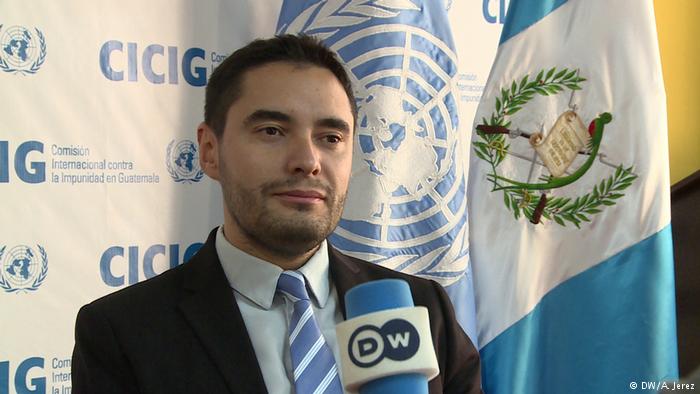STATEMENT 012 | Photo: DW/A. Jerez.
Statement of the sporksperson for CICIG on the return of the Commission to work.
Deutsche Welle: Mr. Ponce, CICIG has been working in Guatemala for 11 years. What have been the results so far?
Matias Ponce: The International Commission against Impunity in Guatemala is the result the peace agreements signed here in Guatemala to create an international commission that would help the country in the fight against impunity. An agreement was signed between the State of Guatemala and the United Nations in 2007 for the establishment of this international commission. In these eleven years of work, CICIG has presented more than 100 cases that involve more than 60 criminal structures. The Commission has accompanied the Attorney General’s Office, first in the investigation of these cases, and later, in their submission to justice. Among its functions, CICIG also accompanies the Attorney General’s Office in litigation procedures, hearings and the design of legal reforms to prevent the recurrence of these illegal and clandestine bodies that co-opted the State of Guatemala.
What kind of cases does CICIG investigate? And which are the most important?
The lines of investigation outlined by the current Commissioner, Iván Velásquez, are linked to illegal electoral contributions, corruption within the State, corruption in the justice sector, and also in the corporate sector, among others. Some of these cases had been broadcasted internationally. The commission cannot highlight one particular case as they all respond to different lines of strategic investigation drawn by the Commissioner.
Last week, CICIG resumed its judicial activities, one month after the Guatemalan Constitutional Court suspended the presidential order that unilaterally ended the agency’s work. Are you working with full normality?
On January 7, the government decided to terminate the agreement that founded theCICIG unilaterally; since then, we have had two significant announcements regarding the normal operation of CICIG. One was the decision of the Guatemalan Constitutional Court to grant an injunction suspending the presidential decision and ordered the government to facilitate the commission’s tasks. On the other hand, the Secretary-General of the United Nations, Antonio Guterres, through a spokesman, expressed his desire for CICIG to fulfill its mandate until September 3, 2019. In this context, CICIG has made a permanent call to respect the Guatemalan Constitutional Court resolutions and, after an operational contingency plan for the safety of its staff, it has resumed its functions in court hearings.
We look forward to returning to our work in the coming days.
However, would you describe your current situation as entirelynormal?
It is not a completely normal situationbecause, for example, Commissioner Iván Velásquez has not been able to return to Guatemala, even when he has publicly expressed his desire to do so. We also have eleven colleagues who have not been able to enter Guatemala either. In this sense, we are looking to fulfill CICIG’s commitment even under the current conditions.
Have you experienced harassment or have you feared for your security since the approval of the unilateral presidential decree?
CICIG has made a permanent call to the State of Guatemala to enforce the agreement. This agreement provides for the State, the Government in this case, to facilitate security, logistic and diplomatic conditions for the activities of the Commission. For example, at this time, we do not have a perimeter protection service that safeguards us; the officers of the National Civil Police who worked with the commission were removed in January. We are trying to adapt to these conditions and continue our work.

